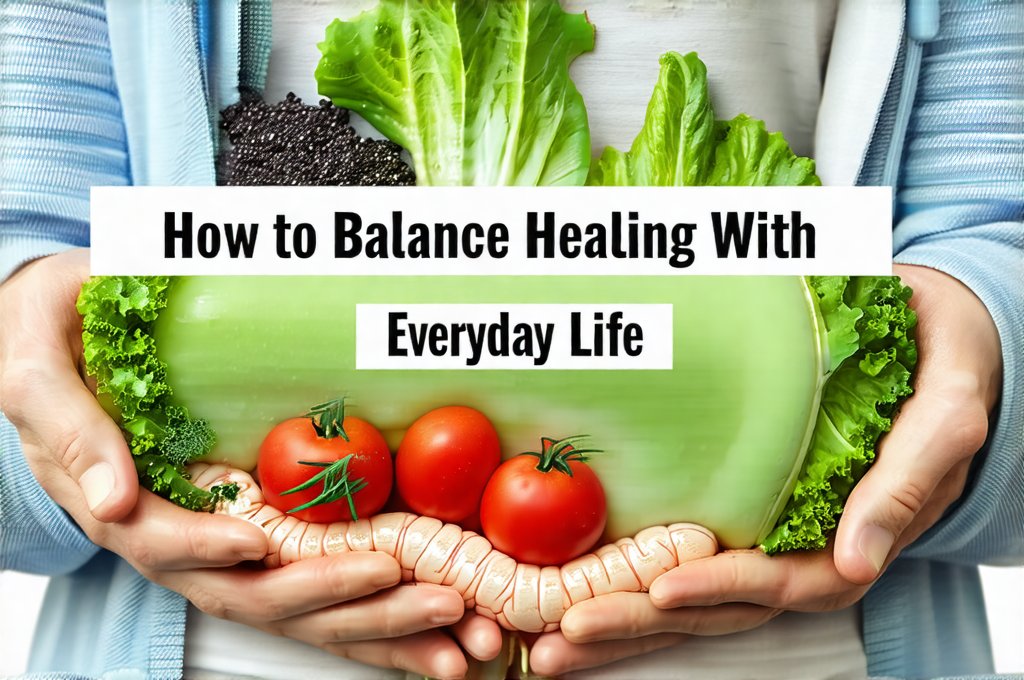Gut health is no longer a fringe wellness topic; it’s increasingly recognized as foundational to overall wellbeing. For many, though, addressing gut issues feels overwhelming – a complete overhaul of lifestyle that’s simply incompatible with the demands of everyday life. The reality is far more nuanced than restrictive diets and complicated supplement regimes. Successfully navigating gut healing isn’t about perfection; it’s about progress, integrating small, sustainable changes into your existing routine. It’s recognizing that healing takes time, patience, and a willingness to listen to your body’s signals.
The challenge often stems from the perceived disruption. People fear giving up favorite foods, spending hours in the kitchen preparing special meals, or feeling isolated from social events centered around food. This leads to discouragement and ultimately abandoning efforts before they’ve had a chance to take root. This article aims to offer a practical guide – not a rigid set of rules – but rather strategies for balancing gut healing with the realities of work, family, social life, and everything in between. We’ll explore how to weave restorative practices into your existing life without feeling deprived or overwhelmed.
The Pillars of Gut-Friendly Living
Gut health isn’t solely about what you don’t eat; it’s overwhelmingly about what you do add – and how you manage stress, sleep, and movement. Focusing on nourishment rather than restriction creates a much more positive and sustainable approach. A healthy gut microbiome thrives on diversity, which means incorporating a wide range of plant-based foods is crucial. This isn’t necessarily about becoming vegan or vegetarian; it’s about prioritizing fruits, vegetables, whole grains, legumes, and fermented foods in your diet. Think adding a side salad to your dinner rather than agonizing over removing the steak.
Beyond food choices, lifestyle factors play an immense role. Chronic stress significantly impacts gut health by disrupting the microbiome and impairing digestion. Similarly, inadequate sleep can lead to inflammation and reduced microbial diversity. Regular physical activity, even moderate exercise like walking, promotes healthy gut motility and reduces stress levels. These aren’t isolated components; they are interconnected pillars supporting a thriving gut ecosystem. Prioritizing all three – diet, stress management, and lifestyle – is essential for long-term success. Understanding [how to balance]https://vitagastro.com/how-to-balance-nutrition-with-food-limitations/ nutrition can be a helpful starting point.
A key aspect often overlooked is mindful eating. Rushing through meals, eating on the go, or being distracted while you eat hinders proper digestion. Taking even five minutes to sit down, chew your food thoroughly, and focus on savoring each bite can dramatically improve gut function. It allows your body to signal fullness appropriately and optimizes nutrient absorption. This simple practice is a powerful tool for supporting gut health without requiring any major lifestyle changes.
Navigating Social Situations & Dining Out
Social events often pose the biggest challenge when implementing dietary changes. Feeling pressured to conform or fearing judgment can lead to anxiety and potentially derail your progress. The key isn’t avoidance but strategic navigation. Before going out, consider what options are likely to be available and mentally prepare a plan for making healthy choices. Don’t be afraid to politely request modifications – most restaurants are happy to accommodate reasonable requests.
- Look for grilled or baked protein sources instead of fried foods.
- Ask for extra vegetables as a side dish.
- Request dressings on the side so you can control the amount.
- Choose water over sugary drinks.
If there are limited healthy options, consider eating something small before going out to avoid arriving overly hungry and making impulsive choices. Remember, one meal won’t make or break your gut healing journey. Focus on making the best choices available in that moment and returning to your regular routine afterward. It’s about balance, not deprivation. A little planning and self-compassion can go a long way. Learning [how to dine]https://vitagastro.com/how-to-dine-out-with-confidence-and-safety/ out confidently can reduce stress around social eating.
The Role of Fermented Foods & Probiotics
Fermented foods are naturally rich in probiotics – beneficial bacteria that support a healthy gut microbiome. Incorporating small amounts of these foods into your diet can be a powerful way to enhance gut health, but it’s important to start slowly and listen to your body. Common examples include yogurt (with live cultures), kefir, sauerkraut, kimchi, kombucha, and miso. Introduce one fermented food at a time and observe how you feel. Some individuals may experience temporary digestive upset as their gut microbiome adjusts.
Probiotic supplements can also be helpful, but they are not a substitute for whole foods. The quality of probiotic supplements varies significantly, so it’s crucial to choose a reputable brand with clinically proven strains. It’s best to consult with a healthcare professional before starting any new supplement regimen. They can help you determine which strains are most appropriate for your individual needs and ensure they don’t interact with any medications you may be taking. Remember that probiotics thrive on prebiotics – fiber-rich foods that feed the beneficial bacteria in your gut. You might also consider [how to train]https://vitagastro.com/how-to-train-your-gut-for-better-tolerance/ your gut for improved tolerance.
Managing Stress & Prioritizing Rest
Chronic stress is a major disruptor of gut health. When you’re stressed, your body releases cortisol, which can negatively impact digestion, reduce microbial diversity, and increase inflammation. Finding effective ways to manage stress is therefore crucial for supporting gut healing. This doesn’t necessarily mean elaborate self-care routines; it’s about incorporating small, consistent practices into your daily life.
- Deep breathing exercises: Even a few minutes of diaphragmatic breathing can help calm the nervous system.
- Mindfulness meditation: Regularly practicing mindfulness can reduce stress and improve emotional regulation.
- Spending time in nature: Exposure to natural environments has been shown to lower cortisol levels.
- Prioritizing sleep: Aim for 7-9 hours of quality sleep each night.
Adequate rest is equally important. Sleep deprivation disrupts the gut microbiome and impairs digestive function. Establish a regular sleep schedule, create a relaxing bedtime routine, and ensure your bedroom is dark, quiet, and cool. Treating stress management and sleep as non-negotiable aspects of your gut healing journey will yield significant benefits. It’s about recognizing that taking care of your mental and emotional wellbeing is an integral part of physical health. Addressing [the fear of]https://vitagastro.com/how-to-handle-the-fear-of-eating-with-a-sensitive-gut/ eating can also ease stress. If you have food sensitivities, consider [building gut resilience]https://vitagastro.com/how-to-build-gut-resilience-in-children-with-food-sensitivities/. Lastly, remember [balancing macros]https://vitagastro.com/how-to-balance-macros-with-food-restrictions/ is also important for overall health.


















